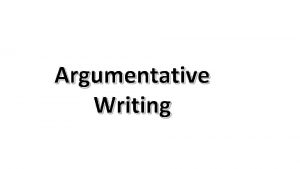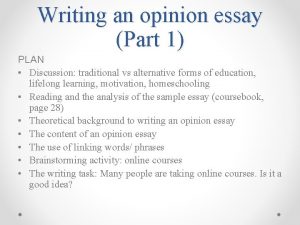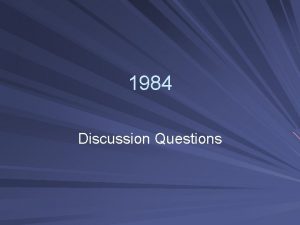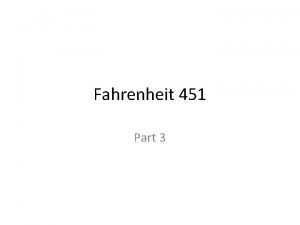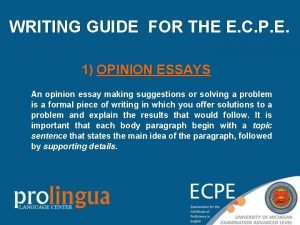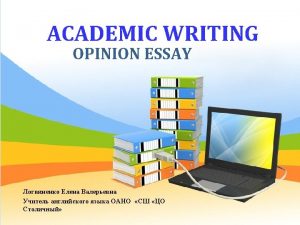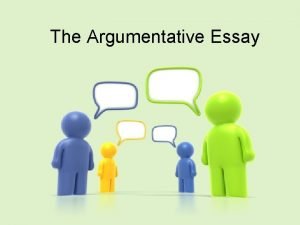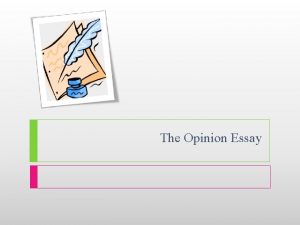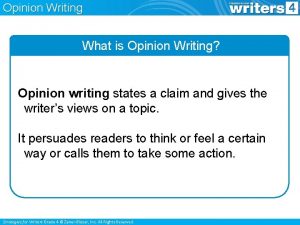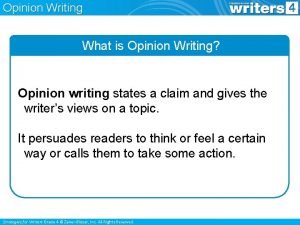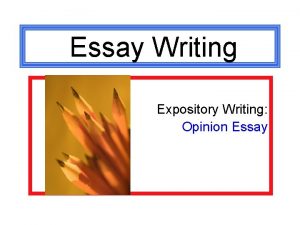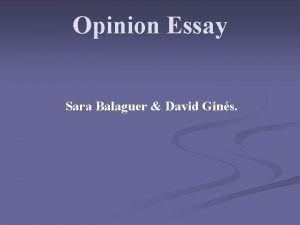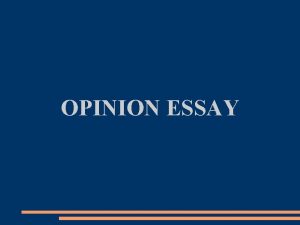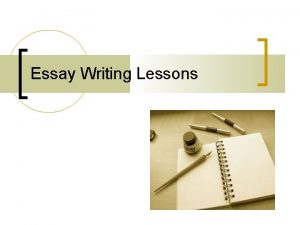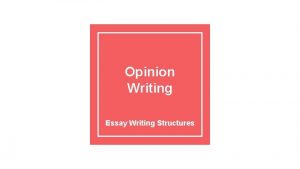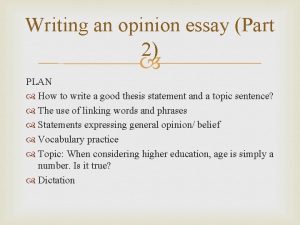Writing an opinion essay Part 1 PLAN Discussion












- Slides: 12

Writing an opinion essay (Part 1) PLAN • Discussion: traditional vs alternative forms of education, lifelong learning, motivation, homeschooling • Reading and the analysis of the sample essay (coursebook, page 28) • Theoretical background to writing an opinion essay • The content of an opinion essay • The use of linking words/ phrases • Brainstorming activity: online courses • The writing task: Many people are taking online courses. Is it a good idea?

Discussion 1. Education in Serbia: possibilities and drawbacks 2. What are the alternative forms to traditional education? What do you think of them? 3. What motivates students/ people to learn? 4. What is lifelong learning? How important is it in the 21 st century? 5. What skills are necessary to ‘’survive’’ in the 21 st century? Does the traditional educational framework cater for the development of these skills? 6. What is homeschooling? What do you think of it?

The analysis of the sample essay (page 28) A The writing task: Nowadays more and more parents homeschool their children. Is this a good idea? 1. Identify what you are asked to write about in your essay! 2. Look at the notes provided. What are you supposed to do with them? 3. Can you think of any other aspect related to homeschooling? Add the aspect(s) to the notes already given. B Read the sample essay. Do you agree with the writer’s opinion?

Comprehension questions • • Is homeschooling a very popular form of education? What do some parents believe about homeschooling? Does the writer share this opinion? What is the writer’s first argument against homeschooling? What will happen to the children who will be homeschooled? What is the writer’s second argument against homeschooling? What is the direct result of this? How will parents who homeschool their children try to compensate for the school environment? • Can homeschooling influence family life? • What is the writer’s advice to parents?

A discursive essay • A discursive essay is a piece of formal writing which discusses a particular issue, situation or problem. There are three types of discursive essays: 1. For and against essays 2. Opinion essays 3. Essays suggesting solutions to problems. (taken from V. Evans, Successful Writing Proficiency)

An opinion essay • It presents someone’s personal opinion related to the issue, situation or a problem. • The opinion should be clearly stated and supported by reasons and/ or examples. • The writer’s opinion should be included in the introduction, and restated/ summarised in the conclusion. • An opinion essay is written in formal language. • It keeps personal references to a minimum. • It uses linking words/ phrases.

A good opinion essay should consist of • An introductory paragraph (in which you clearly state the topic to be discussed, as well as your point of view/ opinion) • A main body (in which points are clearly stated in separate paragraphs; these ideas should also be supported and justified by examples), and • A closing paragraph (in which the general statement of the essay is summarised, and the writer’s opinion restated)

Things to consider • Before you begin writing, you should always make a list of the points you want to present. Make sure these points are meaningful and relevant. • Present each point in a separate paragraph. A well-developed paragraph contains a clear topic sentence, which summarises the contents of the paragraph, as well as a clear justification, explanation or example to support the main point. • Use the appropriate linking words/ phrases to show the links between the paragraphs. Use them also to link sentences within paragraphs. • Avoid strong language, such as I know… I am sure. . etc.

Linking words/ phrases Listing points Adding points Expressing result/ consequence Concluding • first of all, • Also, in • As a result/ • All in all, in the first addition, consequenc overall, to place, to what is e, this way, sum up, start / more, so, summing begin furthermore, therefore, up, in with apart from consequent conclusion, • secondly, this, not ly to thirdly only …but, conclude, • finally, another taking lastly, last point worth everything but not mentioning into least considerati on, all things considered Expressing opinion In my opinion/ view, the way I see it, from my point of view, I personally believe, it is my belief that

Brainstroming Online learning

Writing task: Many people are taking online courses. Is this a good idea? Process: • Think of the relevant points to support/ refute this opinion. • Write the introduction. Briefly introduce the topic, clearly state what you are going to discuss, and express your opinion. • Choose one point to discuss in the first paragraph of the main body. State the point clearly and support it by an example or reason. Connect sentences within the paragraph using linking words.

Homework • Complete the main part of your opinion essay by adding one or two more points. Discuss them in the same manner as described previously. • Use linking words/ phrases to connect paragraph. • Write the conclusion. Restate your opinion. Try to make the statement effective, do not repeat what you wrote in the first paragraph. Use some of the concluding words/ phrases. • Read the essay, paying attention only to the meaning and coherence (do not be distracted by grammar or vocabulary). Make sure your writing is fluent, readable and coherent. • Read the essay and make necessary corrections related to grammar, spelling and vocabulary.
 Whats an argumentative essay
Whats an argumentative essay Opinion essays samples
Opinion essays samples Private opinion becomes public opinion when
Private opinion becomes public opinion when Fractional distillation conclusion
Fractional distillation conclusion Fahrenheit 451 part 3 discussion questions
Fahrenheit 451 part 3 discussion questions 1984 discussion questions part 3
1984 discussion questions part 3 Fahrenheit 451 summary part 3
Fahrenheit 451 summary part 3 Opinion essay ecpe
Opinion essay ecpe Osslt sample opinion essay
Osslt sample opinion essay Essay scheme
Essay scheme Is opinion writing expository
Is opinion writing expository Opinion essay about success
Opinion essay about success Whats an counterargument
Whats an counterargument
